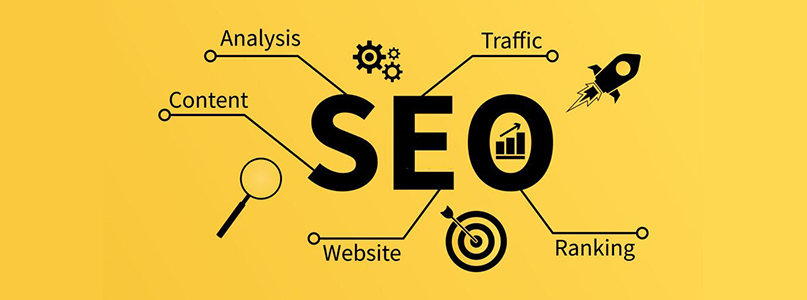Small businesses especially tend to rely on local searches to generate customers. To this end, local SEO is a crucial marketing tool. As many as 46 percent of all Google searches are customers looking for local businesses. To make your business viable within this market, you need to have a local SEO strategy.
In essence, local SEO is indispensable to keep your business relevant. Gone are the days when you could simply build a website and social media. To remain competitive in today’s market, you have to have realistic strategies that create the highest possible visibility for your brand. Local SEO can put you at the top of search engine results.
Tethering keywords to local online searches means you can bring your local business to the top when customers are searching for the product or service you provide. The bottom line here is that local businesses that employ local SEO succeed, and those that ignore local SEO tend to not succeed.
What is local SEO? Why is local SEO important? And what are the benefits of local SEO? This guide will give the basic information on local SEO and how you can use the marketing tool to help your business succeed.
What is Local SEO?
Local search engine optimization, or SEO, is the set of marketing and online tools that improve the visibility of a specific business. Search engines lock onto signals that bring up local content. Things like location, social media profile pages, links, and citations provide information to search engines when anyone performs an online search. To gain the attention of these search engines, you can perform local SEO techniques that will increase the ways these search engines can lock onto your content.
Why Local Search Is Important?
To get an idea of how important local SEO is for business success it makes sense to consider some statistics. Google reports that 76 percent of people who do local searches on their smartphones actually visit a local business within 24 hours. Of that number, 28 percent make a purchase. This means local SEO can potentially result in an increase in business by nearly 30 percent.
In addition, 30 percent of all Google searches are related in some way to location. To get an idea of what this means, of the literally millions of searches Google handles on any given day, nearly a third of those searches pertain to local content. Local SEO can tap into this online traffic and business.
About 60 percent of consumers say they perform a local search every day, and 82 percent of them read online reviews of local businesses before making a purchase decision in the course of their online searches. It is the function of local SEO to tap into these consumers, and turn them into customers.
Nearly 75 percent of shoppers who made a purchase in a brick-and-mortar store said they researched that store and the products online. These customers performed searches that include keywords like “closest store near them.” And in stock near them.” These are precisely the kinds of terms that make up some of the strategies for local SEO.
Difference between Local SEO vs. Organic SEO
Organic SEO is a general term for ranking a business in any web search. It applies to all searches that are not tied to paid advertising. Organic SEO applies to all major search engines like Google, Bing, Yahoo, etc.
Organic SEO can apply to a website for a business, a blog, a news website, e-Commerce store, social media, and all other online property associated with a business. The goal of organic SEO is to make these online resources more visible in a general online search.
High-quality organic SEO structures allow search engines to know with accuracy the content and quality of a business website and other online material.
Local SEO is based on organic SEO. However, local SEO is specifically limited to a strict geographical range. Local SEO is location-based rather than broadly based on internet searches. The goal of local SEO is to specifically make sure that anyone who searches for a product or service is directed through their search engine results to your local business, including the address and other contact information. These results should also include things like hours of operation.
When a consumer searches for a type of business or specific product, local SEO will appear high in their search over more general answers to their search. For example, local SEO help direct consumers who search for hardware to a local hardware store rather than a general online source for their product. Local SEO is also more tied to location than any other types of online identifying features such as blogs or social media.
Organic SEO is about optimizing for content. Local SEO is about optimizing for location.
Local SEO Benefits
Successful businesses utilize local SEO because it works. There are concrete benefits to local SEO. Some of the benefits of local SEO include:
Reach More Customers
Local SEO drives traffic to your website and your brick-and-mortar locations. As we have seen, nearly half of all Google searches are for local businesses. Local SEO captures this web traffic and directs it to your business. This means more customers in your shop or store. Local SEO connects online searches to real businesses, and with the correct information, local SEO directs these online searches directly to your storefront.
Drive more Conversions
Conversions happen because customers find you. With local SEO, you not only get the online visibility necessary to capture customers in their online searches, but you also direct them to your product or service. This means conversions. Research has found that 28 percent of local searches result in conversions, In order to attain this conversion rate, you must have the visibility that comes from high rankings in local search engine results. To obtain this kind of visibility, you need local SEO. Remember, local SEO is driven by location, and this means customers are at your door.
Improve your reputation
Local SEO builds your online reputation. When properly executed, local SEO will direct customers to more than your website. They will also be directed to online reviews and links. These are the online sources that build a good reputation. This process compounds on itself in that the more traffic to your website and your location, the more online reviews and the more frequent the backlinks. Your reputation begins to grow in the best possible ways. And professional marketers know how to perform local SEO procedures that highlight only the best reviews and links to further build your reputation.
How does Local SEO work?
Local SEO can be an involved process, but once you have the rudiments in place, it will grow your business. The basic steps for local SEO include:
Optimize for Google My Business
Google My Business is the premiere site on which to begin local SEO. This is the first place to begin the process of making your business prominent in any web search. To make sure you have optimized for Google My Business you will need to do the following:
- Create and verify your Google My Business page.
- Use Google Posts within your account.
- Encourage customers to share reviews online.
- Respond to reviews with a specific location. Make sure your responses are professional, courteous, and specific to the reviews. Do not use a general form to respond. Customers recognize these things. Always include the specific location and your company name.
If Google can verify that your business traffic is authentic, you can qualify for the sidebar space on a Google search.
Engage Social Media and add Posts to Google My Business
Content shared on social media is becoming increasingly important to Google algorithms. Make sure you share this content on social media and on Google My Business.
Ensure name, address, and phone number are consistent
It is essential that you make it easy for customers to find you. To do this, you need to make your NAP (name, address, and phone number) consistent across all channels. Your NAP is a crawlable HTML text on your website, and this plays a key role in local SEO procedures. Your NAP locks in location-based searches.
Optimize online directories and citations
In the United States, there are four major data aggregators that provide map data for Apple, Yelp, Google, Trip Advisor, and most other online directories. These include:
The most important thing to do with these is to make certain that all information is correct and consistent. Any discrepancies across these directories will cause problems.
Perform a local SEO audit
This is where the process can get complex. Once you have your basic details and information in place, you need to begin the process of local SEO audits. Keep in mind that local SEO is not a one-time thing. It is an ongoing process that requires constant attention. A local SEO audit will include:
- Google My Business Audit – How does your Google My Business appear in the SERPs? Is the information accurate?
- Google Search Console Audit – Is your site crawlable? Does it have any errors that would hinder indexing?
- On-Page SEO Audit – Does your site accommodate all the on-page SEO elements that help ranking?
- Citation Audit – Are all of your citations correct in the top business directories?
- Competitor Analysis – How does your site match up with your competition’s? Are there any gaps that you need to close? How do you match up in terms of inbound links, content, design, and positioning?
- Website Audit – How well is your website performing?
As you can see, the processes of performing local SEO audits can be quite involved, and this is where you should consider turning this over to qualified professionals to optimize your business potential.
Local SEO Tips
- Make sure all your information is correct and consistent across all channels. From your website to social media, check and double-check your NAP and other details.
- Encourage online reviews.
- Respond to these reviews.
- Allow professionals to perform careful local SEO audits.
Local SEO FAQS
What is Local SEO?
Local search engine optimization, or SEO, is the set of marketing and online tools that improve the visibility of a specific business. Search engines lock onto signals that bring up local content. Things like location, social media profile pages, links, and citations provide information to search engines when anyone performs an online search.
Why Local Search Is Important?
To get an idea of how important local SEO is for business success it makes sense to consider some statistics. Google reports that 76 percent of people who do local searches on their smartphones actually visit a local business within 24 hours. Of that number, 28 percent make a purchase. This means local SEO can potentially result in an increase in business by nearly 30 percent.
What is the difference between local SEO and organic SEO?
Organic SEO is a general term for ranking a business in any web search. It applies to all searches that are not tied to paid advertising. Organic SEO applies to all major search engines like Google, Bing, Yahoo, etc. Local SEO is based on organic SEO. However, local SEO is specifically limited to a strict geographical range. Local SEO is location-based rather than broadly based on internet searches. The goal of local SEO is to specifically make sure that anyone who searches for a product or service is directed through their search engine results to your local business, including the address and other contact information. These results should also include things like hours of operation.
Want to get started with Local SEO? Hey Day can help
As you can see, local SEO is essential for your success. When we can consider that nearly 50 percent of all Google searches are for local businesses, it becomes clear that no local business can afford to miss that kind of online traffic. Local SEO is the method for capturing local searches and turning those searches into conversions.
When it comes to brand visibility, it is not enough for franchises to rely on brand names alone. You must also make sure each location is getting attention in organic web searches, and the way to do this is with local SEO. HeyDay Marketing can formulate strategies that work with your budget and create the best return on investment for marketing campaigns and strategies.
HeyDay Marketing offers several packages for you that will create marketing strategies and campaigns that work for your company. We understand that one size does not fit all. For sound marketing campaign strategies that take full advantage of the consumer trends and tendencies of the new year, allow HeyDay Marketing Services to create an integrated marketing strategy that maximizes new year marketing potential.
Wrapping things up
Local SEO is the way to succeed in today’s market. To garner the attention you need to stand out among your competitors, it is essential that you have methods in place that will put your brand at the top of an organic search. Local SEO can do this for you. Local SEO ensures that any time a customer searches your geographical area for the product or service you offer, your name ranks high in this search.
It is also evident that there is quite a lot to perform effective local SEO. While anyone can get things started by building their Google My Business profile, the full benefits of local SEO require many complex steps. This is why it is best to let professional marketers perform these kinds of procedures for you. The payoff in return on investment is high, and the potential for losses, if you do not, is too great.
HeyDay Marketing Services has the professional staff that knows how to do the kinds of optimization techniques that will make your brand visible and known. HeyDay Marketing Services can offer your business local SEO that leads to conversions and business success.






